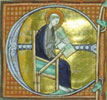Fall & Winter 2009–2010
The art of prophecy is very difficult, especially with respect to the future.
I think it is good that books still exist, but they do make me sleepy.
 Course Description
Course Description
"The History and Future of the Book" (English 204) is one of the English Department's three Foundation Courses and is designed to introduce students to historical and contemporary developments in the technology and impact of the book. It focuses on four aspects of the book's history and its prospects:
- the evolution of media from clay tablets through bound leaves of parchment or paper, to contemporary e-books and web pages;
- the relationship between the medium of expression and literary expression;
- the book's ideological power and the history of its suppression; and
- the relationships between the history of the book and the culture of digital texts.
In the process, we will explore medieval scriptoria; the phenomenon of silent reading; the invention and impact of the Gutenberg printing press; the origins (and futures) of the encyclopedia; the development of copyright law in the eighteenth century and the abuse of it in the twentieth century; book banning and burning; online censorship; the social impact of mass-produced books and of digital texts; and the relationships between media and literature.
What is a book?
In this class we take the definition of "book" to mean a container for ideas, and the material of this container might range from the old bok (beech tablet) to the digital text or "e-book."
A book is:
- "1. The whole Scripture, or some part of it, written together in one Volume, Rev. 22. 18. The book of this prophesie. Luk. 4. 17. He took the book. The Book of Scriptures, Psal. 40. 7. 2. The rehearsal of ones pedegree, or off-spring. Mat. 1. 1. The book of the generation, &c. 3. Every mans conscience or knowledge that he hath of his own doings, good or evil. Rev. 20. 12. Then the Books shall he opened. Book of conscience. 4. Gods providence, or his fore-appointment of all things. Psal. 139. 6. For in thy Book were all things written. Book of providence" (Thomas Wilson, A Complete Christian Dictionary, 1661).
- "either numerous sheets of white paper that have been stitched together in such a way that they can be filled with writing; or, a highly useful and convenient instrument constructed of printed sheets variously bound in cardboard, paper, vellum, leather, etc. for presenting the truth to another in such a way that it can be conveniently read and recognized" (Georg Heinrich Zinck, Allgemeines Oeconomisches Lexicon, 1753).
- "[boc, Sax., supposed from boc, a beech; because they wrote on beechen boards, as liber in Latin, from the rind of a tree.] 1. A volume in which we read or write. ...2. A particular part of a work. ...3. The register in which a trader keeps account of his debts" (Samuel Johnson, A Dictionary of the English Language, 1755–6).
- "more than a verbal structure, or a series of verbal structures; a book is a dialogue with the reader, and the peculiar accent he gives to its voice, and the changing and durable images it leaves in his memory. That dialogue is infinite. ...Literature is not exhaustible, for the sufficient and simple reason that a single book is not. A book is not an isolated entity; it is a narration, an axis of innumerable narrations" (Jorge Luis Borges, Other Inquisitions, 1937–1952, 163–4).
- "both meaning...and the vehicle by which meaning is conveyed (the object of various enterprises of production, distribution, and consumption)" (Cathy Davidson, Reading in America, 15).
- "a 'practice' —a collection of social and economic and artistic activities—and not an 'object'" (Cory Doctorow, Ebooks: Neither E, Nor Books).
- "not limited to print (it includes manuscripts and other written forms), or to the codex format (periodicals and electronic texts come under examination, as do scrolls and book rolls), or to material or literary culture. This vast scope and these blurred boundaries mean that no one can ever be an expert on all its aspects. ... As one of my students once concluded, 'the book is a shape-shifter'" (Leslie Howsam, Old Books and New Histories: An Orientation to Studies in Book and Print Culture).
Is the book solely a finite material object in codex form? Is it a vehicle of "truth"? Or is it more accurately described as a practice, regardless of its material construction? Does the medium matter? Is the text governed by the technologies of its creation and distribution? These are some of the questions we will be asking in this class.